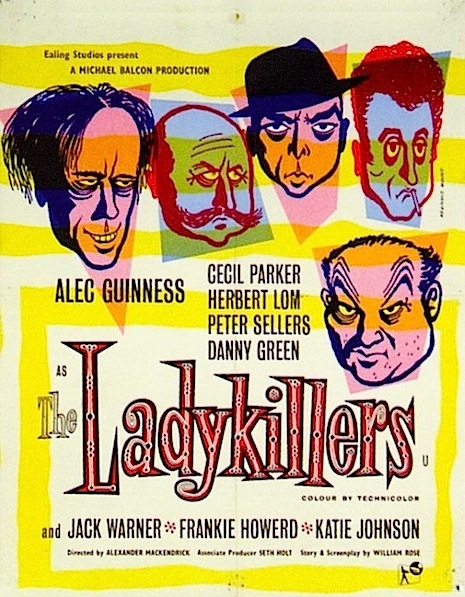
Alec Guinness was almost killed during the filming of the classic Ealing comedy The Ladykillers in 1955. Guinness starred as “Professor” Marcus, the wily head of a gang of crooks responsible for a security van robbery. The Professor’s comically dysfunctional gang consisted of Peter Sellers, Herbert Lom, Cecil Parker and Danny Green as various con men and ne’er-do-wells who decided to hide out in a ramshackle lodging house near to King’s Cross Station—scene of the crime. Here they hoodwinked the benign but eccentric landlady, Mrs. Louisa Wilberforce (the wonderful Katie Johnson), into believing they are a string quintet seeking room to practise their music. As to be expected, murder and mayhem ensue.
Guinness’s brush with death came towards the end of filming, as Piers Paul Read explains in his excellent biography of the actor:
...for the final scene of The Ladykillers, when Alec, as the Professor, is killed by [a] railway signal falling onto his head, the production crew made sure that this would not in fact happen by placing a metal pin half an inch above the level of Alec’s head. Lines were drawn in chalk to mark where he should stand for the shot. When it came to the take, however, the signal sheared the metal pin and tore the back of Alec’s jacket. He had been standing an inch or two in front of the chalk mark—a mistake that saved his life.
It wasn’t the first time Guinness had been nearly killed filming an Ealing comedy. During Kind Hearts and Coronets when Guinness played Admiral Lord d’Ascoyne, he was to nobly salute as he went “down with the ship,” the water swirling around him until utterly submerged leaving only his navy cap to float to the surface. Guinness had told director Robert Hamer that he could hold his breath for four minutes, so filming the scene should prove no problem. Guinness was wired by his feet to the bottom of the tank and the scene shot, but he was then unfortunately forgotten about as the crew wrapped for the day:
Only well into the four minutes was it remembered that Alec was still tethered underwater and one of the crew had to dive into the tank with wire-cutters to set him free.
During Kind Hearts and Coronets Guinness refused to film a scene in which another of his characters, Lady Agatha d’Ascoyne, drifts off in a hot air balloon.
Alec was mocked by the production team for insisting upon a double: sure enough, the balloon drifted away and the double was lucky to return alive.
Another incident occurred during the filming of The Man in the White Suit when a wire supposed to carry Guinness snapped and sent him head first to the ground. Only his swift reflexes and very good luck saved the actor from possible death. Such near fatal mishaps may in part account for Guinness’ later scornful dismissal of his time at Ealing—indeed, the playwright Alan Bennett later recalled how Alec was “scathing about Ealing comedies.”
According to Read what perhaps Alec feared most was that his association with light comic roles meant he “could not master a major role.” This was just his own insecurity giving in to the petty asides of his contemporaries—John Gielgud in particular who snidely suggested Guinness was “good” at “those little parts you do so well.”
Personally, I consider Alec Guinness as nothing but perfection in all of his Ealing roles. He stole Kind Hearts and Coronets from its star Dennis Price, when he played eight different roles—giving each character their own distinct personality. He was seemingly benign but scheming and duplicitous in The Lavender Hill Mob and a naive but brilliant scientist in The Man With The White Suit, while in The Ladykillers Guinness steals virtually every scene he is in and his performance is so credible that you forget this is an actor playing a role.
Sixty years after its release (December 1955) The Ladykillers is still considered one of the greatest comedies ever made (number five in the Guardian’s Top 100 Comedies of All Time), and apart from the misguided remake with Tom Hanks, little has happened over the intervening decades to darken the movie’s great comic brilliance or Alec Guinness’ superb performance.
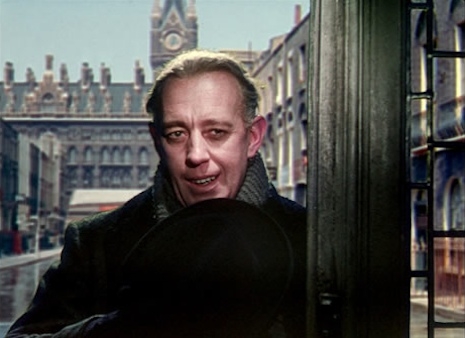
The man himself.
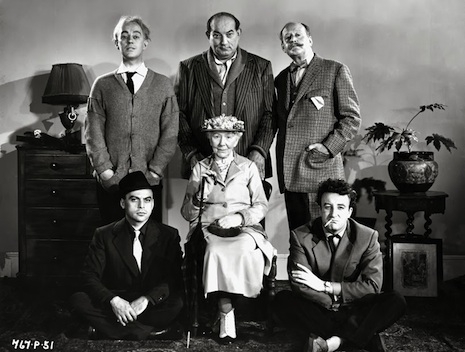
The cast: Back row L-R—Alec Guinness (‘Professor’ Marcus), Danny Green (‘One Round’), Cecil Parker (‘Major’ Claude Courtney). Front row L-R—Herbert Lom (Louis Harvey), Katie Johnson (Mrs. Louisa Alexandra Wilberforce) and Peter Sellers (Harry Robinson).
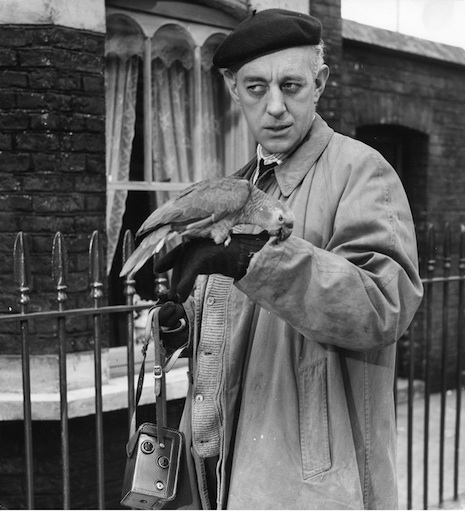
Alec Guinness as ‘Professor’ Marcus.
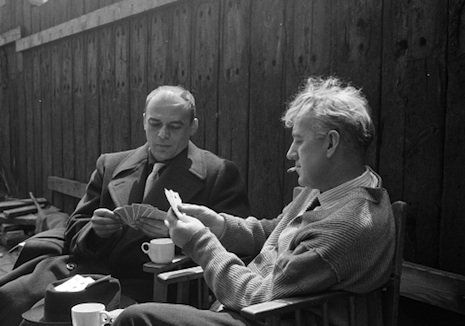
Herbert Lom and Guinness playing cards during filming.






